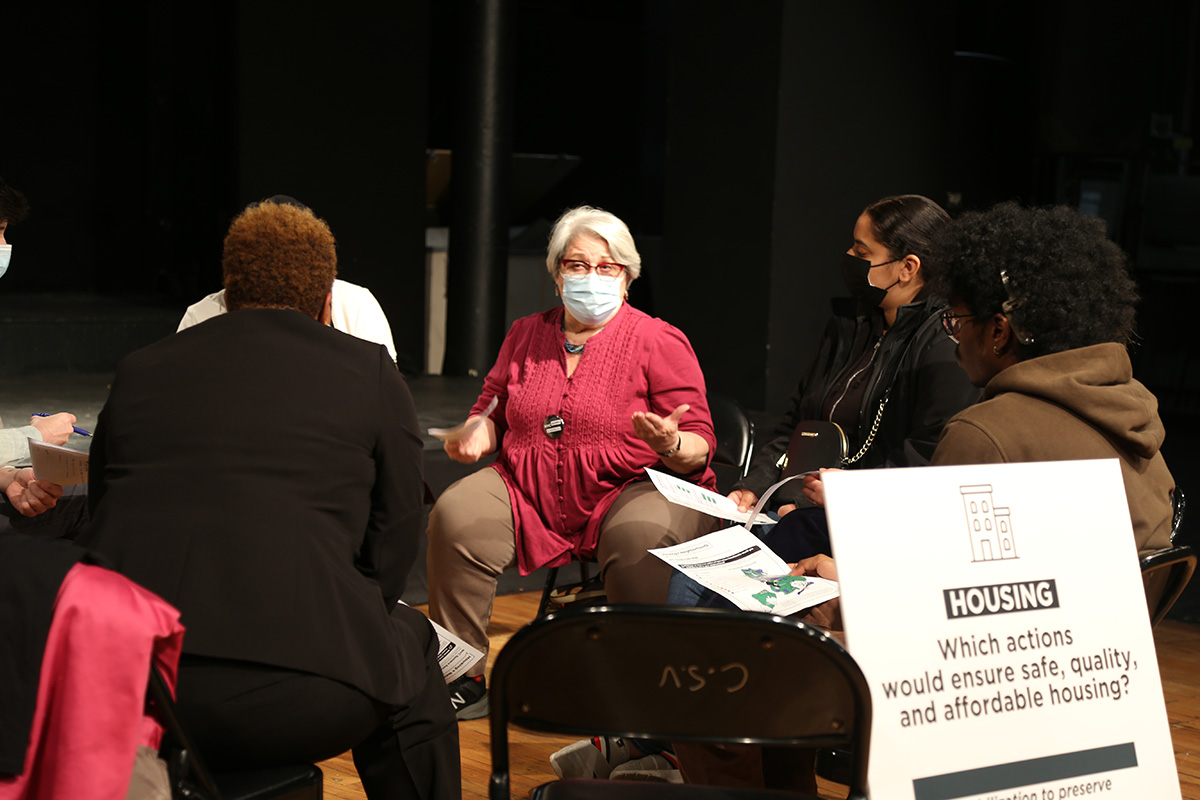
North Star #1
Housing for All
Formerly incarcerated New Yorkers will have the support and resources they need to succeed when they return home.
What We Heard: Building and preserving affordable housing helps create public safety
- Housing = safety: The NYC Speaks survey data revealed that many residents connect increased housing to greater neighborhood safety. Building more affordable housing, protecting renters, and reducing homelessness emerged as the #1 priority for public safety among adults of all income levels. In Community Conversations with residents, supportive housing for unhoused populations emerged as a sustainable solution and top priority to improve community safety – both in their neighborhoods and getting around the city. Individuals felt they would feel safer on public transportation if the City provided holistic care, including housing, to people with mental health challenges and unhoused populations.
- The rent is too damn high!: Many surveyed residents expressed support for expanded rental assistance, which emerged as the #1 priority when asked how to best ensure safe & affordable housing for all New Yorkers.
- Cross-cutting issues: Housing emerged as a priority not just during Housing & Public Safety conversations, but also when speaking about Health & Wellbeing, Climate, and Civic Engagement. Housing – its development, preservation and affordability – is a critical policy solution that addresses multiple areas of city improvement.
How the City is Already Taking Action
The City already has begun to tackle this goal through multiple agencies and policies. To name a few, the Chief Housing Officer published a Blueprint for Housing & Homelessness that targets the delivery of 15,000 supportive units by 2030; the passing of Bill 0147 which requires the Department of Social Services (DSS) to annually report on the number of individuals eligible for, referred to, accepted to, rejected for, and still awaiting placement for supportive housing, and the average length of time the client has been homeless; the partnership with SeaChange Capital Partners to create a fund that blends public dollars with program-related investment (PRI) funds from philanthropic partners to enable non-profits to cover upfront costs and significantly increase the number of high-quality shelters; and the creation of the Justice Involved Supportive Housing (JISH) program that currently includes 120 supportive housing units with plans to add an additional 380 units.
Initial Commitments
- The Corporation for Supportive Housing, in partnership with City Hall and supported by Trinity Church Wall Street Philanthropies and the NYC Fund to End Youth and Family Homelessness, will convene a Justice Learning Collaborative, to map how New Yorkers experiencing homelessness are connected to stable housing and identify gaps, challenges, and opportunities to increase coordination between and among City agencies and community-based housing and service providers, decrease barriers and delays, and increase the number of formerly incarcerated and justice-involved NYers who have a safe place to call home. The Justice Learning Collaborative will bring together leaders from across the intersection of the justice system and housing including: the Chief Housing Officer, Administration for Children’s Services (ACS), NYC Health and Hospitals (H+H), Department of Education (DOE), Department of Corrections (DOC), Department of Housing Preservation & Development (HPD), Mayor’s Office of Criminal Justice (MOCJ), Department of Probation (DOP), Department of Social Services (DSS), District Attorney office representatives, as well as community-based organizations like the Fortune Society, Osborne Association, and the Women’s Community Justice Association.
- Hospital-based Violence Intervention Programs (HVIPs) will coordinate with cross-sector partners to expand their current support and increase funding to transitional housing providers and the number of transitional housing units, which will create secure, trauma-informed transitional housing for victims of non-fatal gun violence. HVIPs are multidisciplinary programs that combine the efforts of medical staff with trusted community-based partners to provide safety planning, social services, and trauma-informed care to violently injured patients, many of whom are boys and men of color with a goal to address underlying risk factors for violence. HVIPs, Trauma Centers, Department of Social Services (DSS), Department of Health and Mental Hygiene (DOHMH), New York Police Department (NYPD), and community-based housing and service providers will work together to expand their current support to include transitional housing. HVIPs will standardize screening, develop and activate a referral network, and provide follow-up coaching and other supportive services to ensure client success.
- Conduct a citywide feasibility assessment for the development of affordable and supportive housing on vacant or underutilized City properties controlled by strategically aligned agencies, beginning with Health + Hospitals (H+H). This will build from existing site identification exercises conducted by the former Comptroller’s Office (among others), expanded to include consideration of financial, physical, and political feasibility of priority sites. This initial assessment of H+H properties will be philanthropically funded; philanthropy may also be interested in co-investment at the development stage via their endowments.
- Develop an anti-discrimination campaign in partnership the Commission on Human Rights (CCHR), philanthropy, and local artists to shift the stigma around people with a history of arrest or conviction, call on landlords to treat applicants and tenants equitably, and promote stable housing for all New Yorkers. This campaign would build on CCHR’s previous work on protecting the rights of people with a history of arrest or conviction in employment.
Metrics
- Number of new supportive housing units
- Number of New Yorkers on probation experiencing homelessness
- Number of New Yorkers on probation that are provided housing

“NYC Speaks has been a living, breathing, and continually evolving process. It is usually not the case for justice-impacted people to have a direct seat at the table. However, everyone went out of their way to ensure each demographic was involved and represented. This initiative set the groundwork for the community, network, and infrastructure to continue the conversation and progress.”

“There’s so much value in what NYC Speaks was able to accomplish. NYC Speaks allowed for a structured space and enough time to really go through an agenda. We were able to focus on particular topics and create action plans while bringing together different sectors to get the whole picture. This initiative was a great model of getting key stakeholders in one room to accomplish a task. We created short term, medium term and long term goals.”